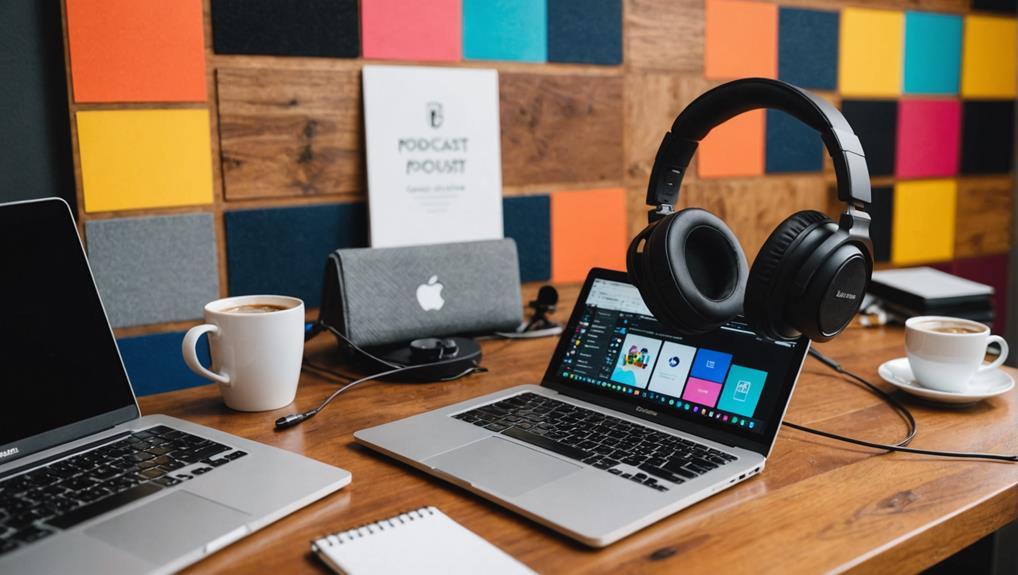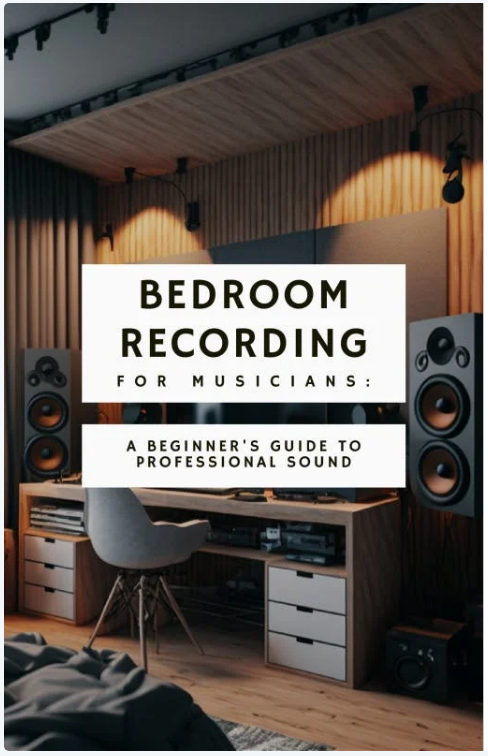If you’re starting your podcasting journey, picking the right microphone can make all the difference. The MAONO USB Microphone offers a high sampling rate for crisp audio, while the Logitech Blue Yeti gives you studio-quality sound with versatile pickup patterns. For mobility, check out the MAYBESTA Wireless Lavalier Microphone, perfect for iPhones and iPads. The FIFINE XLR/USB Microphone balances quality and reliability. If you want pro-grade performance, consider the Shure MV7X. The TONOR USB Microphone and ZealSound USB Microphone are also affordable yet effective options. Explore these picks to find the microphone that suits your unique podcasting needs.
Key Takeaways
- The MAONO USB Microphone offers excellent audio quality and is user-friendly, making it ideal for beginners.
- Logitech Blue Yeti provides studio-quality sound with versatile pickup patterns for various recording needs.
- The MAYBESTA Wireless Lavalier Mic allows for cordless convenience and high sensitivity, perfect for on-the-go recording.
- FIFINE XLR/USB Dynamic Microphone features a cardioid pattern to minimize background noise, ensuring clear audio capture.
MAONO USB Microphone for PC and Podcasting
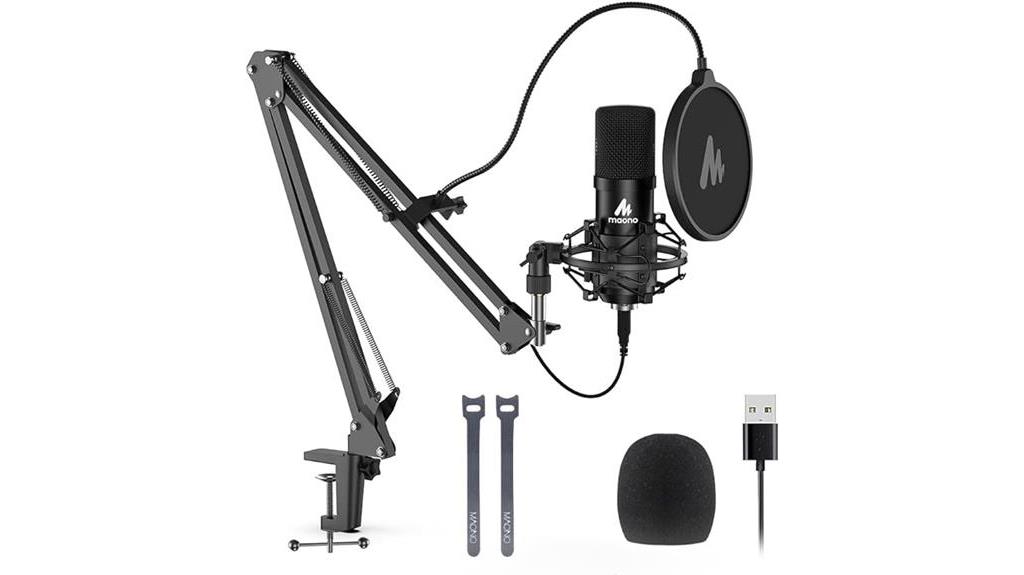
The MAONO USB Microphone is a perfect choice for beginner podcasters looking to kickstart their audio journey with professional sound quality and user-friendly setup.
With its impressive 192kHz/24Bit sampling rate, you’ll capture crisp audio that enhances your podcast’s overall quality.
Setting it up is a breeze—just plug it into your laptop or PC, and you’re ready to go in under five minutes.
The microphone features a robust metal build, ensuring durability, while the included pop filter and foam windscreen keep your sound clear.
Plus, its adjustable scissor arm offers flexible positioning, perfect for any recording space.
Overall, this microphone provides great value and is highly rated among users, making it an excellent investment for your podcasting needs.
Best For: Beginner podcasters and content creators seeking a high-quality, easy-to-use microphone for various applications.
Pros:
- Excellent sound quality with a high sampling rate of 192kHz/24Bit.
- User-friendly setup that requires no extra drivers, making it ideal for quick recordings.
Cons:
- Some users have reported concerns about the durability of the stand connector.
- The microphone’s sensitivity may pick up unwanted background noise.
Logitech Blue Yeti USB Microphone for Gaming and Streaming
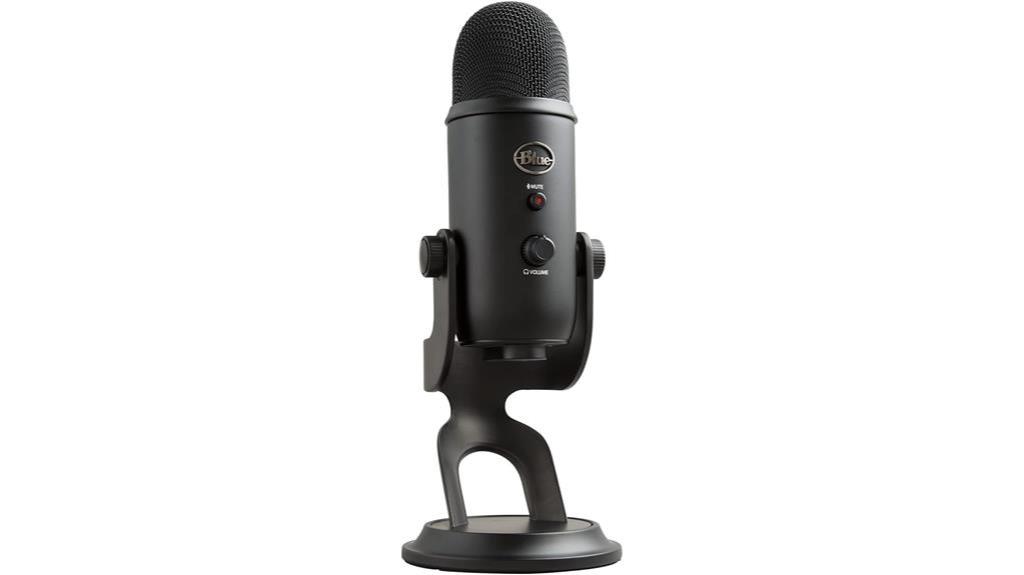
Designed for creators, the Logitech Blue Yeti USB Microphone delivers studio-quality sound, making it an ideal choice for beginner podcasters, gamers, and streamers alike.
This versatile mic features a custom three-capsule array that guarantees clear, powerful audio across various applications. With four pickup patterns—cardioid, omnidirectional, bidirectional, and stereo—you can easily adapt to different recording needs. Plus, its sleek design and adjustable stand make it user-friendly.
Setting up the Blue Yeti is a breeze, thanks to its plug-and-play functionality that works seamlessly with most recording software. Onboard audio controls, including headphone volume and mic gain, enhance your experience.
With a high rating from thousands of users, the Blue Yeti stands out as a top choice in the market.
Best For: The Logitech Blue Yeti USB Microphone is best for beginner podcasters, gamers, and streamers seeking high-quality audio performance.
Pros:
- Excellent sound quality with a custom three-capsule array.
- Versatile recording options with four selectable pickup patterns.
Cons:
- Price may be a consideration for casual users.
- Weighs 3.5 pounds, making it less portable.
MAYBESTA Professional Wireless Lavalier Microphone for iPhone and iPad
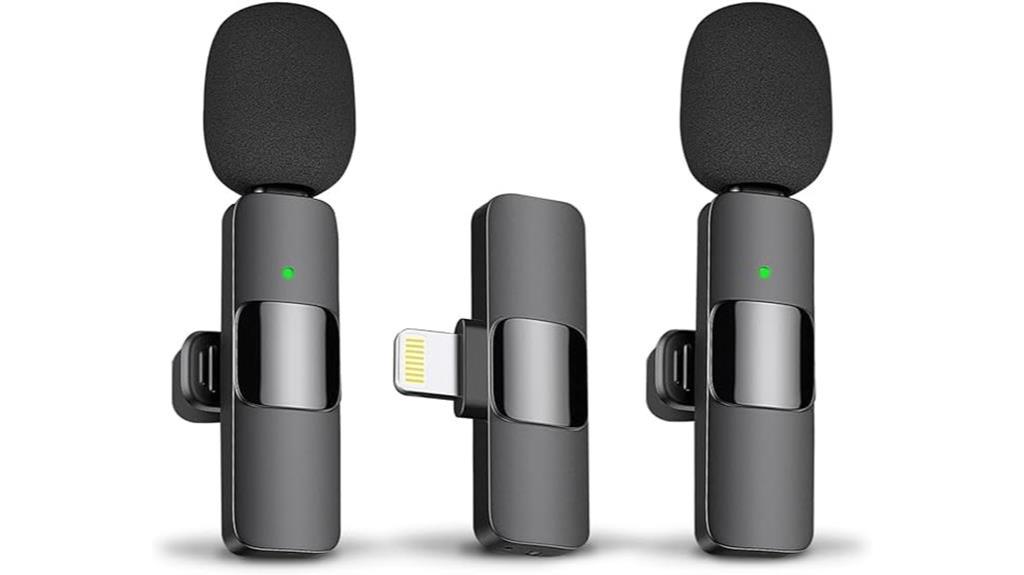
Offering exceptional audio clarity and ease of use, the MAYBESTA Professional Wireless Lavalier Microphone is perfect for beginner podcasters looking to elevate their content.
This cordless omnidirectional microphone connects directly to your iPhone or iPad, making setup a breeze—just plug in the receiver and switch on the mic.
With a wireless range of up to 50 feet, you can move freely during recordings. The high-sensitivity mic captures clear audio while minimizing background noise, ensuring your voice stands out.
Plus, it boasts a rechargeable battery that lasts up to 4.5 hours, allowing for extended sessions without interruptions.
Weighing only 20 grams, it’s lightweight and portable, making it an ideal choice for any budding podcaster.
Best For: Content creators and beginner podcasters seeking a user-friendly and portable microphone solution for high-quality audio recording.
Pros:
- Easy plug-and-play setup eliminates the need for adapters or additional software.
- Omnidirectional sound reception ensures clear audio quality with minimal background noise.
Cons:
- Not compatible with USB-C devices like iPhone 15 or iPad Pro series.
- Some users reported audio clarity issues when moving during recordings.
FIFINE XLR/USB Dynamic Microphone for Podcast Recording
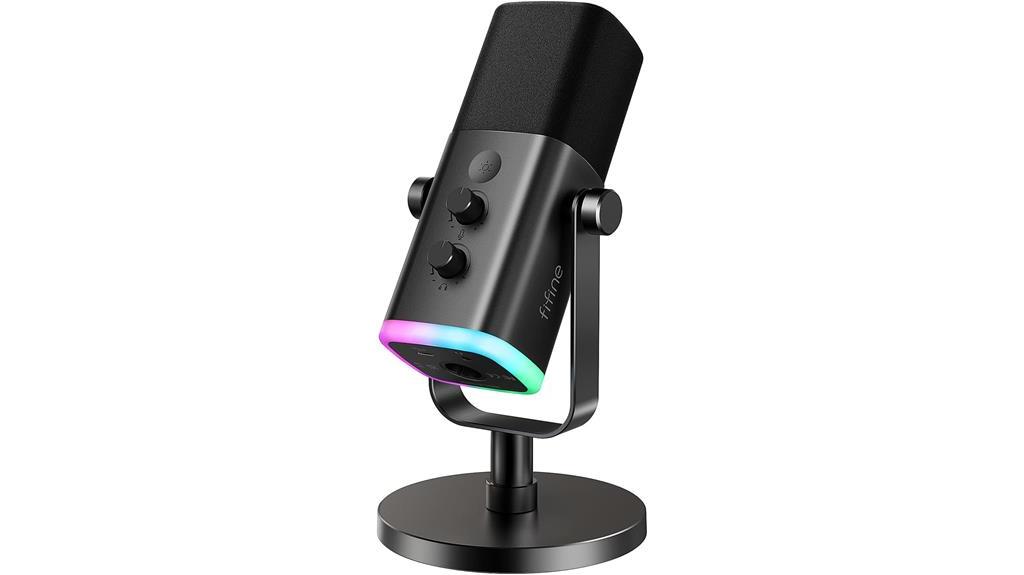
Perfect for beginners, the FIFINE XLR/USB Dynamic Microphone combines ease of use with exceptional audio clarity, ensuring your podcast sounds professional right from the start.
Weighing just 790 grams, this desktop microphone features a frequency response of 50Hz-16KHz, allowing for balanced audio capture. Its cardioid pattern effectively rejects unwanted background noise, enhancing vocal clarity during recordings.
You can easily switch between XLR and USB connections, making it versatile for various setups. The built-in tap-to-mute button and LED reminder add convenience, while the RGB ring with customizable colors gives a stylish touch.
Plus, the headphones jack allows for real-time monitoring. With a solid 4.5-star rating, it’s a top choice for aspiring podcasters looking for quality and reliability.
Best For: Aspiring podcasters and gamers seeking a versatile and user-friendly microphone with high audio quality.
Pros:
- Exceptional audio clarity with a frequency response of 50Hz-16KHz, ideal for vocal recordings.
- Versatile connectivity options with XLR and USB connections, accommodating various setups.
Cons:
- Plastic construction may raise concerns about long-term durability for some users.
- Limited customization options for RGB lighting and audio adjustments as per user feedback.
Shure MV7X XLR Podcast Microphone – Pro Quality Dynamic Mic
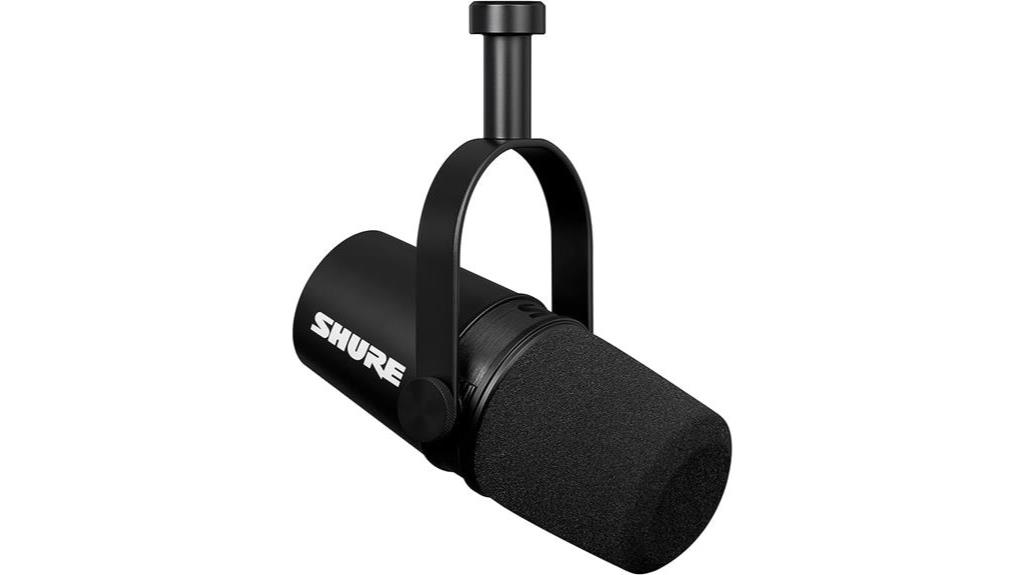
The Shure MV7X XLR Podcast Microphone delivers professional-quality sound that’s ideal for beginner podcasters looking to elevate their audio game without breaking the bank. This dynamic microphone features voice isolation technology, ensuring your voice stands out while minimizing background noise. With an all-metal construction and a design modeled after the renowned SM7B, it promises durability and reliability.
The MV7X connects directly to professional audio interfaces via XLR, eliminating the need for an in-line preamp. Users appreciate its clear, balanced tone and rich sound quality, making editing a breeze.
Although it can pick up desk noise, using a table stand or shock mount can help mitigate that. Overall, it’s a fantastic investment for anyone serious about podcasting.
Best For: Beginner podcasters and content creators seeking professional sound quality at an affordable price.
Pros:
- Voice isolation technology effectively minimizes background noise for clearer recordings.
- Durable all-metal construction ensures longevity and reliability for everyday use.
Cons:
- May pick up desk noise, requiring additional accessories like a shock mount for optimal performance.
- Requires good gain settings to achieve the best sound quality, which may be challenging for beginners.
TONOR USB Microphone for PC Gaming and Streaming
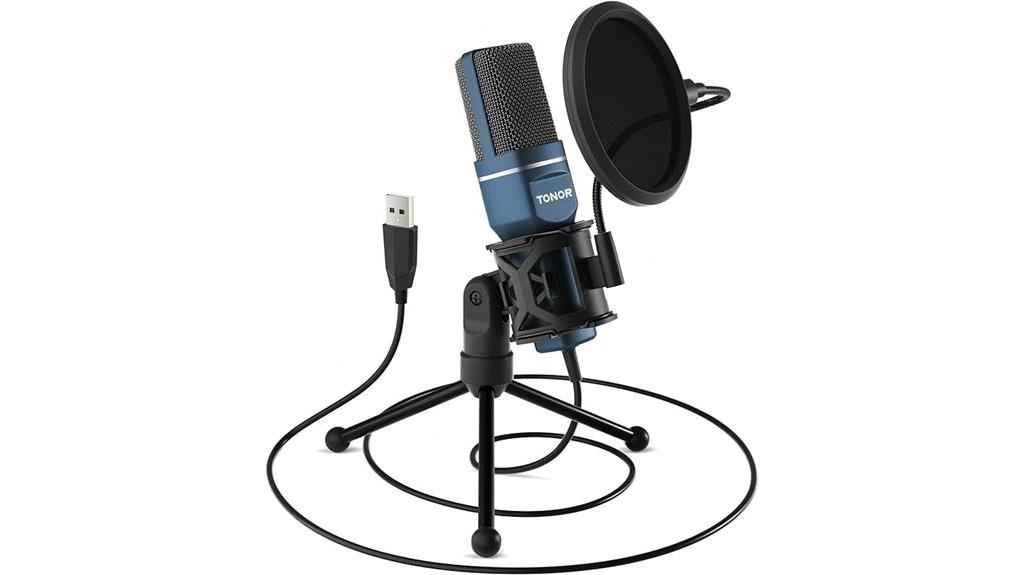
With its plug-and-play convenience and cardioid pickup pattern, the TONOR USB Microphone is an excellent choice for beginners diving into podcasting or streaming.
This compact condenser mic is easy to set up—just plug it into your laptop or desktop, and you’re ready to go. Weighing only 12.2 ounces, it’s portable and perfect for various setups.
Although it provides decent audio quality with clear vocals, you might need to speak close to the mic for ideal volume. While it lacks gain control and can pick up some background noise, it excels in versatility, making it suitable for Zoom calls, YouTube videos, and casual recording.
Overall, it’s a solid choice for budget-conscious users seeking quality without complexity.
Best For: Budget-conscious beginners looking for a reliable microphone for casual audio needs such as streaming, podcasting, and video conferencing.
Pros:
- Affordable price point for entry-level users.
- Plug-and-play convenience with no additional drivers required.
Cons:
- Limited frequency response and no gain control feature.
- Requires speaking close to the mic for optimal volume, which may be inconvenient.
ZealSound USB Microphone for PC and Gaming
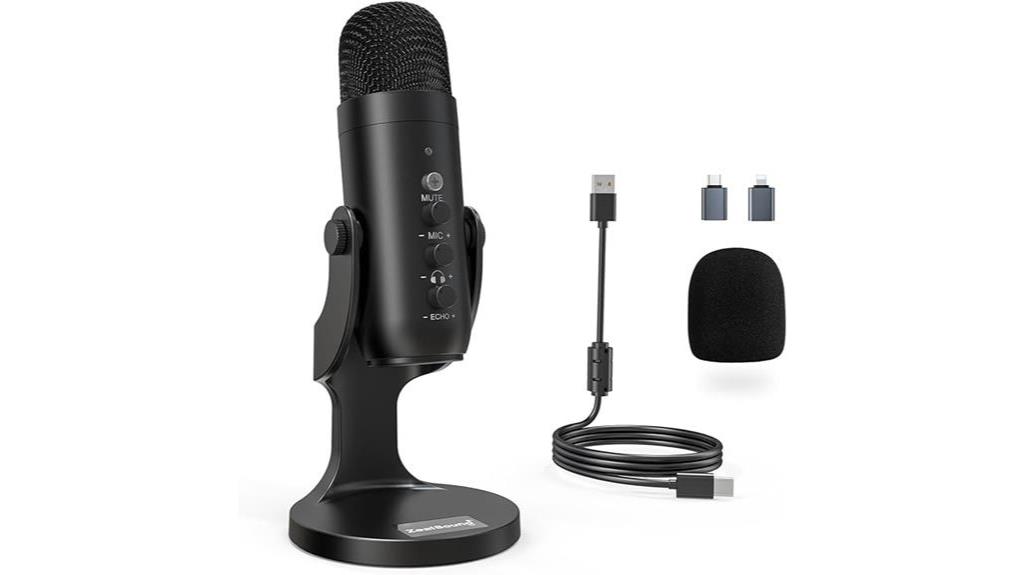
Ideal for beginner podcasters, the ZealSound USB Microphone delivers exceptional audio quality and a user-friendly plug-and-play setup, making it easy to start recording right away.
This versatile microphone works seamlessly with various devices, including PCs, laptops, and even gaming consoles. With a wide frequency response and effective noise cancellation, you’ll capture crystal-clear audio for your podcasts and streaming sessions.
The mic features a professional gain knob, allowing you to adjust volume and sensitivity effortlessly. Plus, with live monitoring through a 3.5mm headphone jack, you can guarantee your audio sounds perfect in real-time.
Its sturdy design and included accessories make it a reliable choice for any content creator looking to enhance their audio experience.
Best For: Beginner podcasters and content creators seeking an easy-to-use microphone with excellent audio quality.
Pros:
- Exceptional audio quality with a wide frequency response and effective noise cancellation.
- User-friendly plug-and-play setup that works seamlessly with various devices.
Cons:
- Below-average packaging that may not meet expectations.
- Some users noted the windscreen quality could be improved.
Factors to Consider When Choosing Microphones for Beginner Podcasters
When choosing a microphone for your podcast, you should consider several key factors.
Audio quality, microphone type, and connectivity options all play significant roles in your overall experience.
Plus, keeping your budget and user-friendly features in mind will help you make the best choice for your needs.
Audio Quality Importance
Audio quality plays an essential role in your podcast’s success, as it directly influences how engaged your listeners will be. Higher fidelity recordings not only sound more professional but also create a more enjoyable experience.
When choosing a microphone, consider the frequency response range; a range between 20Hz to 20kHz is vital for capturing the full spectrum of human voice sounds, guaranteeing clarity and richness in your recordings.
Another key factor is the signal-to-noise ratio (SNR). Aim for a microphone with an SNR above 80 dB to minimize background noise and make certain your voice comes through clear and prominent. Additionally, opt for a microphone with a cardioid pickup pattern. This feature considerably reduces the pickup of unwanted ambient noise, allowing your voice to stand out.
Don’t overlook sensitivity, either. Measured in dB, a microphone with higher sensitivity captures softer sounds better, making it ideal for nuanced vocal performances.
Microphone Type Options
Choosing the right microphone type can greatly impact the quality of your podcast, especially as you consider factors like your recording environment and your level of experience.
If you’re recording in a noisy space, dynamic microphones are often the best choice. They excel at rejecting background noise, making them perfect for untreated rooms.
On the other hand, if you have a controlled studio setting, you might prefer a condenser microphone. These mics capture a wider frequency range and deliver clarity, which is excellent for voice recordings.
For beginners, USB microphones offer a hassle-free option. They plug directly into your computer, eliminating the need for additional equipment.
If you’re looking to advance your setup later on, consider XLR microphones. They provide professional audio quality but require extra gear and knowledge to make the most of them.
Ultimately, if you need something portable, lavalier microphones are a great choice for hands-free operation. However, be aware that they can pick up more ambient noise than handheld options.
Connectivity and Compatibility
Understanding connectivity and compatibility is essential for beginner podcasters, as it directly affects the ease of setup and usage of your microphone. Look for microphones that offer plug-and-play connectivity, making setup a breeze without the hassle of additional drivers or software. This simplicity is vital when you’re just starting out.
Make sure the microphone you choose is compatible with various devices like PCs, laptops, and mobile phones. This versatility allows you to record in different environments and platforms, enhancing your podcasting experience. USB microphones are particularly user-friendly, as they typically work seamlessly with both Windows and macOS systems.
Be cautious, though—some microphones might need extra adapters for specific devices, such as OTG adapters for mobile phones, which can complicate things for beginners. Opting for a microphone with standard connections like XLR or USB is a wise choice.
These formats are widely supported, ensuring your gear can work with various audio interfaces and mixers, should you decide to expand your setup later on. By considering connectivity and compatibility, you’ll set a solid foundation for your podcasting journey.
Budget Considerations
Budget plays an essential role in selecting the right microphone for your podcasting journey, as you’ll find options that range from around $60 to several hundred dollars.
If you’re just starting out, you can find quality microphones, like dynamic and condenser types, priced between $50 to $100. These models often strike a great balance between affordability and sound quality.
Don’t forget to factor in additional costs, such as pop filters, shock mounts, and boom arms, which can add anywhere from $20 to $100 to your overall expenditure.
If you’re on a tight budget, consider entry-level USB microphones priced under $60. These options can deliver excellent audio performance, making them ideal for new podcasters.
Investing wisely in a microphone that offers good value for money is vital. Look for customer reviews and ratings to help you make an informed decision without overspending.
By keeping your budget in mind and selecting wisely, you can enhance your podcasting experience while staying within your financial limits.
Balancing quality and cost will set you up for success on your podcasting journey.
User-Friendly Features
When selecting a microphone for your podcast, look for user-friendly features that simplify the setup and enhance your recording experience. Choose microphones with plug-and-play functionality; this allows you to get started quickly without needing additional drivers or complicated installations. It’s perfect for beginners who want a hassle-free start.
Adjustable gain controls are another feature to take into account. They help you manage audio sensitivity, ensuring ideal sound levels during your recordings. Additionally, microphones with built-in monitoring capabilities, like a headphone jack, let you perform real-time sound checks, which can greatly improve audio quality.
You should also think about user-friendly design elements, such as adjustable stands or shock mounts. These features enhance stability and ease of use, making your recording sessions smoother and more enjoyable.
Portability and Design
Portability and design play vital roles in helping you choose the right microphone for your podcasting needs. As a beginner podcaster, you’ll want a lightweight microphone, ideally between 1.1 to 1.4 pounds, making it easy to transport and set up wherever you go.
Compact designs, typically around 5 to 6 inches tall, guarantee that your microphone fits snugly on small desks or recording spaces without cluttering your environment.
Look for microphones that offer plug-and-play setups. These user-friendly features eliminate complicated installation processes, allowing you to focus on creating content rather than fussing with gear.
Durability is also essential; choose a microphone made from robust materials like metal or high-grade plastic. This way, it can withstand frequent movement and use during your recordings.
Additionally, consider microphones with adjustable stands or built-in mounting options. This flexibility allows you to adapt the microphone’s placement for ideal audio capture in various settings.
Versatility for Applications
Choosing a microphone that offers versatility in applications is vital for beginner podcasters who want to adapt their setup for different recording environments and uses. Look for microphones with multiple pickup patterns, like cardioid, omnidirectional, and bidirectional. These options allow you to record solo, conduct interviews, or capture group discussions with ease.
Compatibility with various devices and software is another significant factor. Make sure your microphone can connect seamlessly to laptops, PCs, and popular recording platforms, so you won’t face any hiccups during your sessions. A plug-and-play microphone makes things even simpler, allowing you to set up and start recording without complicated installations or drivers.
Also, consider built-in features like noise cancellation and pop filters. These enhancements improve audio quality by reducing background noise, allowing your listeners to focus on your content.
Accessories and Setup
Having the right accessories and setup can greatly enhance your podcasting experience, making it easier to achieve high-quality audio from the start. Many beginner microphones come with essential accessories, such as pop filters and shock mounts. These items help reduce plosive sounds and stabilize your recordings, guaranteeing clearer audio.
Look for microphones that feature a plug-and-play setup, allowing you to connect quickly to your computer without dealing with complicated installation processes. This convenience is especially important when you’re just starting out.
Adjustable stands or scissor arm mounts are also beneficial, giving you flexibility in positioning the microphone for ideal sound capture and comfort during long recording sessions.
Additionally, consider microphones with built-in monitoring capabilities. This feature lets you listen to your audio in real-time through a headphone jack, helping you balance levels and improve sound quality.

